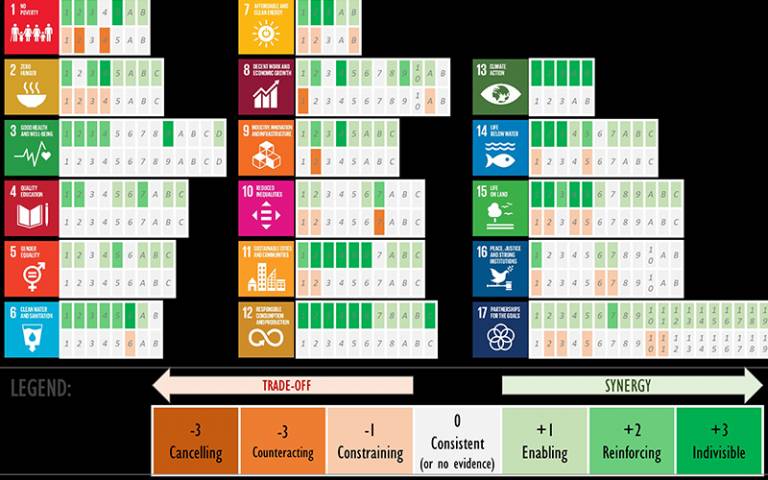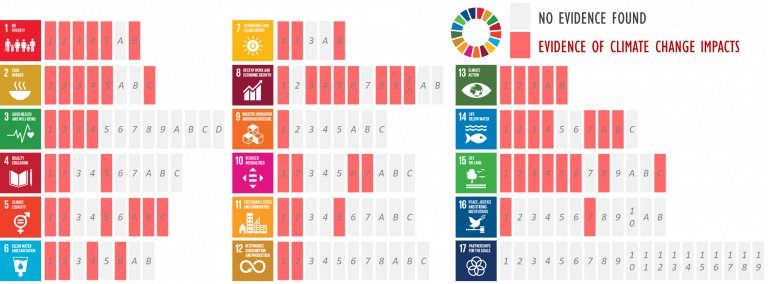ISR academics contribute to Nature Sustainability paper on Sustainable Development Goals
16 July 2019
ISR academics Julia Tomei, Ben Milligan and Nick Hughes have contributed to a Nature Sustainability paper published on Monday, 'Connecting climate action with other Sustainable Development Goals'.

Press release: What does climate change mean for sustainable development?
Written by Francesco Fuso Nerini (Lead author)
While climate change is likely to hinder progress towards nearly all SDGs, well-planned climate mitigation and adaptation could help unlock the large majority of the SDGs targets. But to do so, climate action needs to be harmonized with other sustainable development policy.
These are crucial times for climate action. On the one hand, the current and potential impacts of climate change are becoming more evident than ever (and harder to ignore). On the other hand, political support for climate action has eroded in some countries and climate policies have been increasingly undermined.
The latter can be partly attributed the limited structured and holistic knowledge on what impacts climate change (and the actions taken to combat it) might have on sustainable development across all spheres – which can result in uncoordinated policy action.
The purpose of our research and our ensuing Perspective was to help overcome that knowledge gap. This meant looking at all 169 Targets of the Sustainable Development Goals (SDGs) and investigating how each would be affected by 1) climate change and 2) the actions necessary to address it.
The initial task to pursue such assessment was also the most important. We needed to assemble an authoring team with enough expertise to assess knowledge across all disciplines covered by the SDGs, from poverty to health, ecosystems, inequalities and physical systems, and across all countries. From the beginning we were aware that any authoring team would have gaps when assessing knowledge across all SDGs, but we did our best to try not to forget any discipline. Mapping topics to expertise and reaching out to our extended networks resulted in our current authoring team, with a wide expertise spanning engineering, natural and social sciences and past work covering all continents.
The next step was to use our combined expertise to assess the existing knowledge on the interlinkages between climate change, climate action, and all SDGs. That led to interesting discussions and learning for all of us. While each author was aware of the potential impact climate change might have in her/his field(s) of expertise, working together made us realize just how large and widespread the impacts might be across all sectors. Climate change threatens to undermine about 40 percent of the targets across 16 SDGs. Such impacts spread across all countries. The message was clear: climate action is needed, as no matter where you live or work climate change will impact your life.

Figure 1 Impacts of climate change on the achievement of the SDGs´ targets. Taken from the published Perspective
The second part of our research identified both opportunities and possible inhibitors for climate action. The good news is that climate action can be synergetic with all SDGs (~ 80% of all Targets), possibly enabling prosperous, equal and peaceful societies that use resources efficiently while minimizing environmental impacts.
Perhaps more importantly, we also identified areas in which development gains could be at odds with climate action and vice versa. While we found approximately four times fewer trade-offs than synergies between the two domains, those frictions have the potential to act as a roadblock to climate action, or conversely, to stifle other development gains. Put differently, if the balance between climate action and the wider development agenda is not managed carefully, measures to curb greenhouse gases emissions could backfire. Climate policies, if not carefully designed could be socially and economically regressive and could disproportionally impact certain economies /groups in the short term (e.g. those relying on incomes from fossil fuels). In some instances, national climate adaptation programs have even resulted in violence and conflict, such as the forced displacement of poor communities in Bangladesh.
When it comes to governance, we found that both at the national and international level, many decisions about climate change and sustainable development remain isolated within their respective silos. This being said, we are also starting to witness the emergence of promising new approaches that consider both sets of challenges in tandem. Our Perspective, suggests a way forward to better connect climate action with the broader sustainable development agenda, and in doing so, to reinforce and legitimize actions in both domains.
Perhaps the most humbling aspect of this work was coming to the realisation of just how complex working across all SDGs could be. This required compiling and making sense of a wide array of knowledge and information scattered across different institutions, locations, and disciplines. However, working alongside researchers from different disciplines was also immensely inspiring. All authors agreed that the research community has the duty to step up and find shared solutions to our time’s intertwined and difficult challenges. Our Perspective looks at promising developments in that direction, and proposes some actions.
So, what’s next? First of all, we’d like to invite anyone interested in further refining or expanding our analysis to please do so! While we did our best to capture a great number of interlinkages across all SDGs, this is just a beginning, and there remain many gaps and nuances to consider. The sheer complexity of the task and the breadth of knowledge required to undertake it is such that it can only be improved by engaging with a larger pool of experts from various disciplines and other stakeholders. Our hope is that our Perspective will fuel a discussion on how to better connect climate action to the broader sustainable development agenda and play a small role in promoting mutually enhancing outcomes to deliver a better world by 2030 and beyond.
 Close
Close

